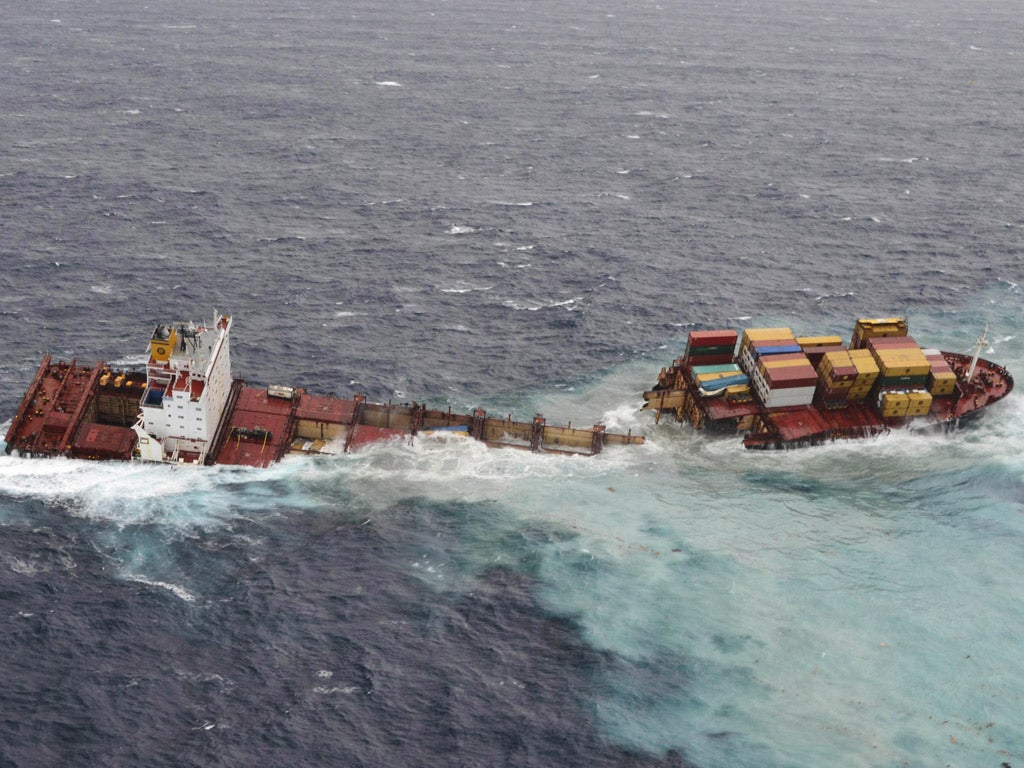
Your support helps us to tell the story
From reproductive rights to climate change to Big Tech, The Independent is on the ground when the story is developing. Whether it's investigating the financials of Elon Musk's pro-Trump PAC or producing our latest documentary, 'The A Word', which shines a light on the American women fighting for reproductive rights, we know how important it is to parse out the facts from the messaging.
At such a critical moment in US history, we need reporters on the ground. Your donation allows us to keep sending journalists to speak to both sides of the story.
The Independent is trusted by Americans across the entire political spectrum. And unlike many other quality news outlets, we choose not to lock Americans out of our reporting and analysis with paywalls. We believe quality journalism should be available to everyone, paid for by those who can afford it.
Your support makes all the difference.New Zealand braced for a new oil spill last night after a storm broke up a cargo ship that has caused the country's worst maritime environmental disaster.
The Greek-owned Rena, which has been wedged on a reef off North Island for three months, split in two yesterday, tipping hundreds of containers into the sea. Maritime officials said oil was leaking from the ship.
Thousands of seabirds were killed when the ship crashed into the Astrolabe Reef on 5 October, with more than 300 tons of heavy fuel oil released into the Bay of Plenty and fouling pristine beaches.
Nearly 1,000 tons of oil have been pumped off the Rena, but more than 300 tons remain on board.
Maritime New Zealand said both parts of the wreck are stuck on the reef, 12 miles off Tauranga, on North Island's east coast.
But the stern section had been forced at least 100 feet away from the bow and was "moving significantly", lashed by 19-foot swells.
Oil was set to reach the shore late last night, with oil-spill response teams on alert. "While reports at this stage indicate there has not been a significant release of oil, with the Rena in its current fragile state a further release is likely," said national on-scene commander, Alex van Wijngaarden.
About 300 of the ship's 1,370 containers – loaded with meat, timber, deer hides, recyclable plastics and milk powder – were lost when the Rena broke up, and officials said they could present a danger to shipping.
The regional council said it was considering extending the three-nautical mile exclusion zone now in place around the 46,484-ton, Liberian-registered Rena.
Despite the oil on board, Environment minister, Nick Smith, said risks to the environment were "a fraction of what they were in October", when a huge clean-up operation was necessary. Most of the remaining oil is in tanks in the stern section, which could end up sinking.
That would mean some oil dispersing in the ocean rather than washing up on beaches. Mr van Wijngaarden said "much less" oil was expected to reach shore this time.
The chief executive of the Port of Tauranga, Mark Cairns, said some containers had been spotted 20 miles from the ship, after being swept away.
The storm is forecast to last for up to four more days. Salvage crews have plucked some 400 containers from the Rena since it ran aground and 100 or so have washed overboard in the past three months.
"While the two sections [of the ship] remain on the reef, both are now open to the sea and vulnerable to more damage," Maritime New Zealand's salvage unit manager, David Billington, said yesterday. The Rena's captain and navigating officer, both Philippine nationals, have been charged with operating a ship in a dangerous manner, polluting the environment and altering the ship's documents after the crash.
Both of the men are presently being held on bail. They are both also being held at a secret location because of fears that presently exist for their safety.
Join our commenting forum
Join thought-provoking conversations, follow other Independent readers and see their replies
Comments